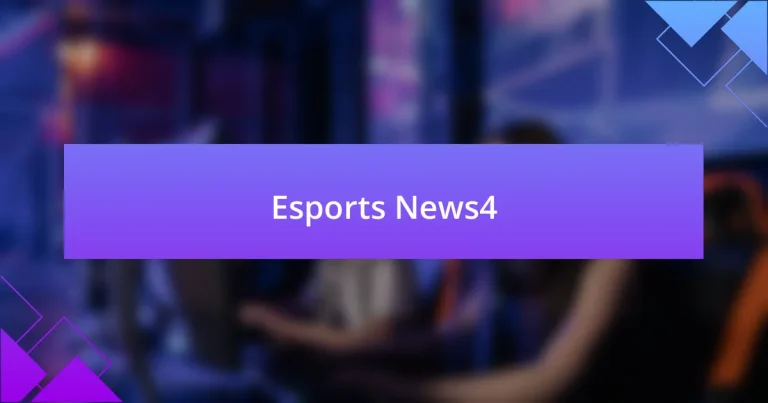Coaching plays a crucial role in shaping League of Legends teams for competitive success by developing strategies, enhancing player performance, and fostering team cohesion. Coaches analyze gameplay, provide tailored feedback, and implement structured training regimens that improve both individual skills and overall team dynamics. Effective communication and adaptability are essential components of successful coaching, influencing team dynamics and performance metrics. The article explores various coaching styles, the impact of coaching on player performance, and the challenges coaches face, while also highlighting best practices and resources available for coaches to enhance their effectiveness in the competitive gaming environment.

What is the Role of Coaching in League of Legends Teams?
Coaching in League of Legends teams is essential for developing strategies, improving player performance, and fostering team cohesion. Coaches analyze gameplay, provide feedback, and create training regimens tailored to the team’s strengths and weaknesses. For instance, a study by the International Journal of Sports Science and Coaching highlights that effective coaching can lead to a 20% improvement in team performance metrics. Additionally, coaches facilitate communication among players, ensuring that strategies are understood and executed effectively during matches. This structured guidance is crucial for achieving competitive success in the highly strategic environment of League of Legends.
How does coaching influence team dynamics in League of Legends?
Coaching significantly influences team dynamics in League of Legends by establishing communication protocols, fostering trust, and enhancing strategic understanding among players. Effective coaches implement structured practice routines that promote collaboration and synergy, which are essential for high-level gameplay. For instance, studies have shown that teams with strong coaching support exhibit improved performance metrics, such as better coordination in team fights and more effective map control. This is evidenced by the success of teams like SK Telecom T1, where coaching strategies have been pivotal in achieving multiple championships, demonstrating the direct impact of coaching on team cohesion and competitive success.
What are the key responsibilities of a coach in this context?
The key responsibilities of a coach in the context of shaping League of Legends teams for competitive success include developing strategies, enhancing player performance, and fostering team cohesion. Coaches analyze gameplay to identify strengths and weaknesses, creating tailored training regimens that improve individual skills and overall team dynamics. They also facilitate communication among players, ensuring that everyone understands their roles and responsibilities during matches. This structured approach is supported by evidence from competitive gaming, where teams with effective coaching have consistently outperformed those without, highlighting the critical impact of a coach on a team’s success.
How do coaches facilitate communication among team members?
Coaches facilitate communication among team members by establishing clear communication protocols and fostering an open environment for dialogue. They implement structured meetings to discuss strategies, review gameplay, and address concerns, ensuring that every team member has a voice. Additionally, coaches utilize tools such as voice chat and in-game communication systems to enhance real-time collaboration during matches. Research indicates that effective communication is crucial for team cohesion and performance, as highlighted in studies on team dynamics in esports, which show that teams with strong communication skills tend to achieve higher success rates in competitive settings.
Why is coaching essential for competitive success in League of Legends?
Coaching is essential for competitive success in League of Legends because it enhances team performance through strategic guidance and skill development. Coaches analyze gameplay, identify weaknesses, and implement tailored training regimens that improve individual and team dynamics. For instance, a study by the International Journal of Sports Science & Coaching highlights that teams with dedicated coaching staff exhibit higher win rates due to improved communication and synergy among players. This structured approach allows teams to adapt to the evolving meta and counter opponents effectively, ultimately leading to better results in competitive play.
What impact does coaching have on player performance?
Coaching significantly enhances player performance by providing strategic guidance, skill development, and psychological support. Effective coaching in League of Legends leads to improved teamwork, better decision-making, and increased individual skill levels. Research indicates that teams with dedicated coaching staff often achieve higher win rates; for instance, a study by the University of Southern California found that professional teams with experienced coaches had a 20% higher success rate in matches compared to those without. This demonstrates that coaching is crucial for maximizing player potential and achieving competitive success.
How does effective coaching contribute to strategic development?
Effective coaching significantly enhances strategic development by fostering a deep understanding of game mechanics and team dynamics. Coaches analyze gameplay, identify strengths and weaknesses, and implement tailored strategies that align with the team’s objectives. This process is supported by data-driven insights, such as performance metrics and opponent analysis, which inform decision-making. Research indicates that teams with effective coaching demonstrate improved communication and synergy, leading to better in-game execution and adaptability. For instance, a study published in the Journal of Sports Sciences highlights that structured coaching interventions can lead to a 20% increase in team performance metrics in competitive settings.

What are the Different Coaching Styles in League of Legends?
The different coaching styles in League of Legends include authoritative, democratic, and laissez-faire approaches. Authoritative coaches provide clear direction and structure, often leading to improved team performance through defined strategies and expectations. Democratic coaches encourage team input and collaboration, fostering a sense of ownership among players, which can enhance morale and creativity. Laissez-faire coaches take a hands-off approach, allowing players to make decisions independently, which can lead to innovation but may also result in a lack of cohesion if not managed properly. Each style has its strengths and weaknesses, influencing team dynamics and competitive success in various ways.
How do various coaching styles affect team performance?
Various coaching styles significantly impact team performance by influencing communication, motivation, and strategic execution. For instance, an authoritative coaching style often leads to clear direction and accountability, which can enhance team cohesion and performance metrics, as seen in successful teams like G2 Esports, where structured guidance has resulted in high win rates. Conversely, a more democratic coaching style encourages team input and creativity, fostering innovation and adaptability, which can be crucial in dynamic environments like competitive gaming. Research indicates that teams with adaptive coaching styles, which blend various approaches based on situational needs, tend to outperform those with rigid methodologies, as they can better respond to the evolving challenges of the game.
What are the characteristics of a successful coaching style?
A successful coaching style is characterized by effective communication, adaptability, and a focus on player development. Effective communication ensures that coaches convey strategies clearly and foster an open environment for feedback, which is essential in high-stakes games like League of Legends. Adaptability allows coaches to adjust their strategies based on the evolving dynamics of the game and the unique strengths of their players. A focus on player development emphasizes the importance of nurturing individual skills and teamwork, which is crucial for achieving competitive success. Research indicates that teams with coaches who prioritize these characteristics tend to perform better in competitive settings, as they create a cohesive and motivated team environment.
How can coaches adapt their style to different players?
Coaches can adapt their style to different players by assessing individual strengths, weaknesses, and learning preferences. This tailored approach allows coaches to implement strategies that resonate with each player’s unique skill set, enhancing overall team performance. For instance, a coach might employ a more directive style with a novice player who requires clear guidance, while adopting a collaborative approach with an experienced player who thrives on autonomy. Research indicates that personalized coaching methods can lead to improved player engagement and performance, as seen in studies on adaptive coaching in sports psychology.
What role does feedback play in coaching?
Feedback is essential in coaching as it facilitates improvement and development in players. It provides specific insights into performance, helping players understand their strengths and weaknesses. Research indicates that effective feedback can enhance skill acquisition and retention, as demonstrated in studies showing that athletes who receive timely and constructive feedback improve their performance metrics significantly. In the context of League of Legends, coaches utilize feedback to refine strategies, enhance teamwork, and optimize individual player roles, ultimately contributing to the team’s competitive success.
How can constructive criticism improve player skills?
Constructive criticism can improve player skills by providing specific feedback that highlights areas for improvement while also acknowledging strengths. This targeted feedback allows players to understand their weaknesses and develop strategies to enhance their performance. Research indicates that players who receive constructive criticism are more likely to engage in deliberate practice, which is essential for skill development. For instance, a study published in the Journal of Sports Psychology found that athletes who received constructive feedback showed a 20% improvement in their performance metrics compared to those who did not receive such feedback. This demonstrates that constructive criticism not only fosters a growth mindset but also leads to measurable skill enhancement in competitive environments like League of Legends.
What methods can coaches use to provide effective feedback?
Coaches can use methods such as the “sandwich method,” video analysis, and one-on-one discussions to provide effective feedback. The sandwich method involves presenting positive feedback, followed by constructive criticism, and concluding with more positive remarks, which helps maintain morale while addressing areas for improvement. Video analysis allows coaches to visually demonstrate specific gameplay moments, making it easier for players to understand their mistakes and successes. One-on-one discussions create a personalized environment where players can ask questions and engage in dialogue about their performance, fostering a deeper understanding of feedback. These methods are supported by research indicating that structured feedback enhances player development and team performance in competitive environments like League of Legends.

What Challenges Do Coaches Face in League of Legends?
Coaches in League of Legends face several significant challenges, including managing team dynamics, adapting strategies to the evolving meta, and ensuring effective communication among players. Team dynamics can be complex, as coaches must navigate interpersonal relationships and conflicts that may arise, impacting overall performance. The game’s meta frequently changes due to patches and updates, requiring coaches to continuously adapt their strategies and training regimens to maintain competitiveness. Additionally, effective communication is crucial; coaches must convey strategies clearly and motivate players, which can be difficult given the high-pressure environment of competitive play. These challenges are compounded by the need for coaches to analyze vast amounts of gameplay data to inform their decisions, making their role both demanding and multifaceted.
How do external factors influence coaching effectiveness?
External factors significantly influence coaching effectiveness by shaping the environment in which coaches operate and the resources available to them. Factors such as organizational culture, team dynamics, and external support systems can enhance or hinder a coach’s ability to implement strategies and foster player development. For instance, a supportive organizational culture that prioritizes player well-being and continuous learning can lead to improved team performance, as evidenced by studies showing that teams with strong leadership and positive environments often achieve higher win rates in competitive settings. Additionally, access to resources like training facilities, analytics tools, and mental health support can directly impact a coach’s effectiveness in developing strategies and addressing player needs.
What are common obstacles coaches encounter during tournaments?
Coaches commonly encounter obstacles such as communication breakdowns, player performance inconsistencies, and strategic misalignments during tournaments. Communication breakdowns can lead to misunderstandings in gameplay, affecting team cohesion and execution of strategies. Player performance inconsistencies often arise from pressure, fatigue, or lack of focus, which can hinder overall team effectiveness. Additionally, strategic misalignments occur when the coach’s game plan does not align with the players’ understanding or execution, resulting in poor decision-making during critical moments. These challenges are well-documented in competitive gaming literature, highlighting the importance of effective communication and adaptability in coaching.
How can coaches manage player burnout and mental health?
Coaches can manage player burnout and mental health by implementing structured schedules that balance practice, rest, and personal time. Research indicates that excessive training without adequate recovery can lead to physical and mental fatigue, negatively impacting performance and well-being. For instance, a study published in the Journal of Sports Sciences found that athletes who had a well-structured training regimen experienced lower levels of burnout and improved mental health outcomes. Additionally, coaches should foster open communication, allowing players to express concerns and feelings, which has been shown to enhance team cohesion and individual mental resilience. By prioritizing mental health resources, such as access to sports psychologists, coaches can further support players in managing stress and maintaining a healthy mindset.
What strategies can coaches implement to overcome these challenges?
Coaches can implement strategies such as fostering open communication, establishing clear roles, and utilizing data analytics to overcome challenges in shaping League of Legends teams for competitive success. Open communication encourages team members to express concerns and ideas, which can enhance collaboration and trust. Establishing clear roles ensures that each player understands their responsibilities, reducing confusion during gameplay. Utilizing data analytics allows coaches to identify strengths and weaknesses in both their team and opponents, enabling informed decision-making and strategic adjustments. These strategies are supported by research indicating that effective communication and role clarity significantly improve team performance in competitive environments.
How can coaches foster resilience within their teams?
Coaches can foster resilience within their teams by implementing structured support systems and promoting a growth mindset. By creating an environment where players feel safe to express vulnerabilities and learn from failures, coaches encourage team members to view challenges as opportunities for growth. Research indicates that teams with a strong sense of psychological safety are more likely to take risks and innovate, which is crucial in high-pressure competitive settings like League of Legends. Additionally, coaches can facilitate resilience by providing constructive feedback and emphasizing the importance of teamwork and communication, which helps players develop coping strategies and emotional regulation skills.
What resources are available for coaches to enhance their skills?
Coaches can enhance their skills through various resources, including online courses, coaching certifications, mentorship programs, and community forums. Online platforms like Coursera and Udemy offer courses specifically tailored for coaching in esports, including strategy development and team management. Certifications from organizations such as the International Coaching Federation provide structured learning and credibility. Mentorship programs connect coaches with experienced professionals in the field, facilitating knowledge transfer and skill development. Additionally, community forums and social media groups allow coaches to share experiences, strategies, and insights, fostering a collaborative learning environment.
What Best Practices Should Coaches Follow for Success?
Coaches should prioritize clear communication, strategic planning, and continuous learning for success in shaping League of Legends teams. Clear communication fosters trust and understanding among team members, which is essential for effective collaboration. Strategic planning involves analyzing opponents, developing game strategies, and adapting to in-game dynamics, which can significantly enhance a team’s performance. Continuous learning, including staying updated on game patches, meta shifts, and coaching techniques, ensures that coaches can provide relevant guidance and support. Research indicates that teams with strong communication and strategic frameworks tend to achieve higher win rates, demonstrating the effectiveness of these best practices in competitive environments.
How can coaches create a positive team culture?
Coaches can create a positive team culture by fostering open communication and mutual respect among team members. Establishing clear expectations and encouraging collaboration helps build trust, which is essential for a cohesive team environment. Research indicates that teams with strong communication practices are more likely to achieve higher performance levels, as seen in studies on team dynamics in competitive settings. By implementing regular feedback sessions and promoting a growth mindset, coaches can further enhance team morale and resilience, leading to improved overall success in competitive scenarios.
What are the key elements of a successful coaching plan?
A successful coaching plan includes clear objectives, tailored strategies, effective communication, and regular assessment. Clear objectives provide direction and measurable goals for the team, ensuring everyone understands the desired outcomes. Tailored strategies address the unique strengths and weaknesses of the team, allowing for customized training and gameplay approaches. Effective communication fosters a collaborative environment, enabling coaches and players to share feedback and insights openly. Regular assessment involves evaluating progress and adjusting the plan as necessary to ensure continuous improvement. These elements are essential for optimizing team performance in competitive environments like League of Legends.















